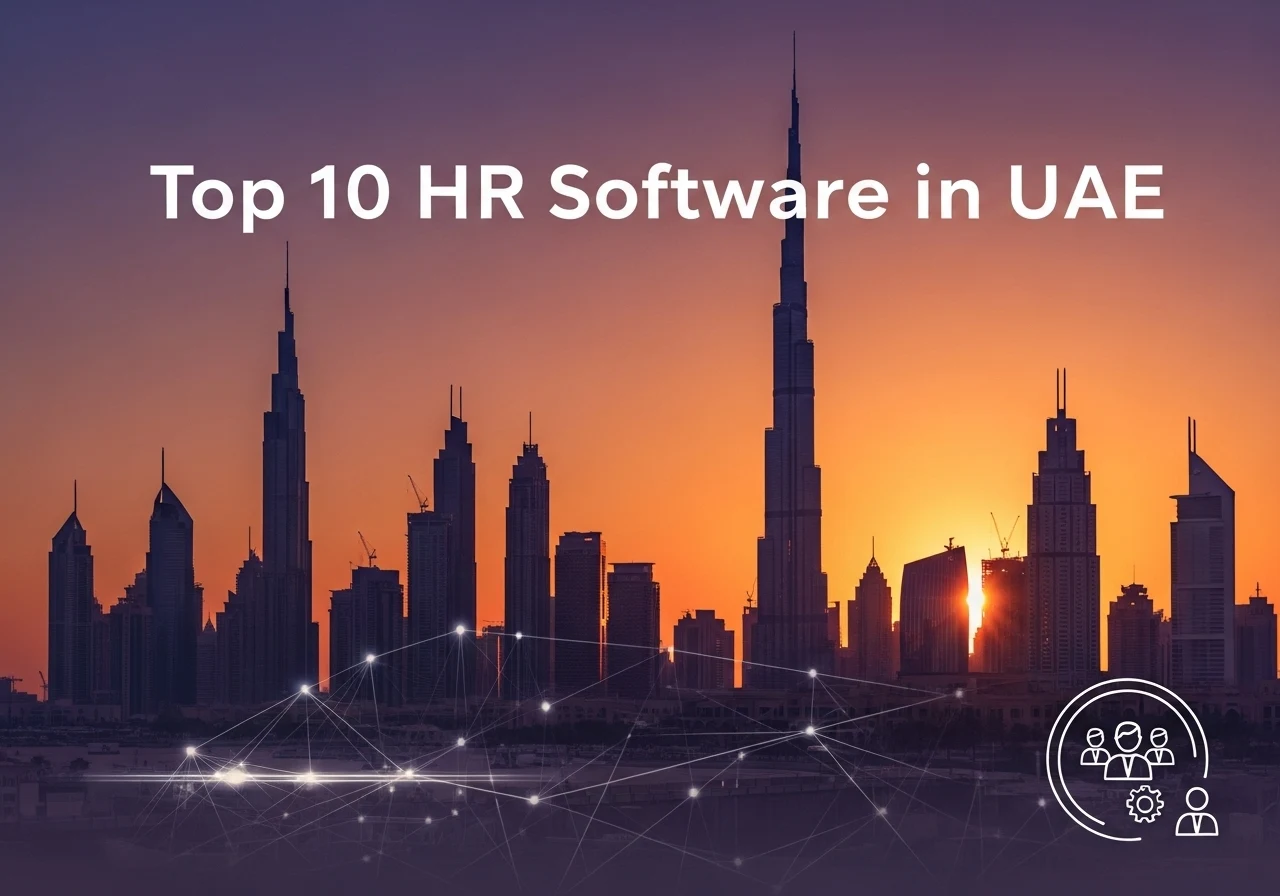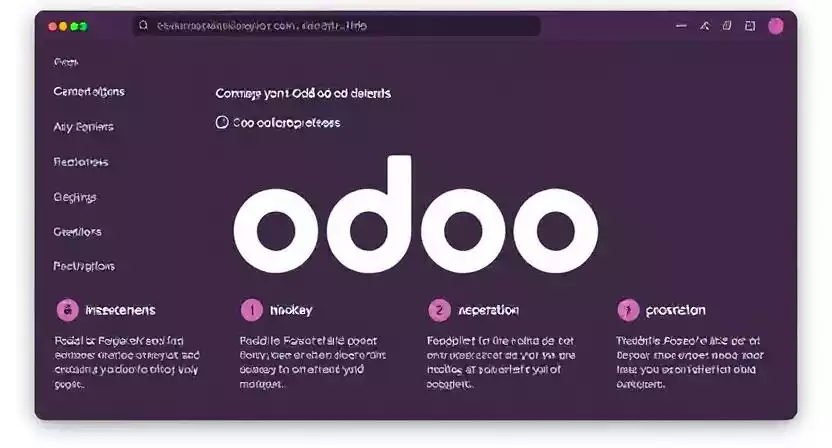Why HR Software Matters for UAE SMEs
Choosing the right HR-software is more than picking a tool. For SMEs in the UAE, you’re not just automating leave-requests or pay-runs: you’re covering complex compliance (labour law, end-of-service benefits, Emiratisation), ensuring data privacy, keeping costs manageable, and enabling growth. With the proper HRMS (Human Resource Management System) you can save time, reduce errors, support remote/hybrid work, and keep your teams engaged. In the digital transformation journey, HR is no longer just “back-office”: it becomes a strategic hub.
Table of Contents
How I selected these tools
I looked at HRMS systems that:
- Are available or actively used in the UAE / Middle East region.
- Offer core HR features (payroll/benefits, leave/attendance, performance, reporting).
- Have publicly stated pricing or at least flexible plans for SMEs.
- Provide support for compliance with UAE labour law, or regionalised capability.
- Have both strengths and limitations (so you can weigh trade-offs).
Now, let’s dive into the list.
1. Elate HRMS
Features:
Elate HRMS is designed especially for UAE businesses. It covers recruitment & onboarding, employee self-service, attendance & leave, performance management, and payroll. They highlight use of automation to eliminate manual HR tasks.
Pros:
- Localised for UAE (which means compliance and region-specific workflows)
- Good automation focus (less manual work)
- Full HR lifecycle covered from hire to retire
Cons: - May have more features than a very small SME needs (so potential cost/complexity)
- As a specialist UAE tool, the global/enterprise ecosystem might be less broad than large multinational tools
Pricing:
Specific pricing is not clearly listed publicly (at the time of writing), so you’ll need to request a quote for your size and modules needed.
Best for:
UAE SMEs wanting a locally-tailored HRMS with full HR lifecycle coverage and less need for multi-country global setups.
Top 10 HRMS Software in UAE: Leading Solutions for Efficient HR Management
2. Darwinbox
Features:
Darwinbox is a broader HRMS platform used across Asia and the Middle East. It covers core HR, talent management, payroll, analytics, and mobile support. On review sites you’ll find pricing and comparison data.
Pros:
- Strong functionality and feature-rich, suitable for growth.
- Good analytics and talent-management modules (so helps beyond just admin tasks).
Cons: - For a very small SME, the depth may mean more training/implementation required.
- Pricing may scale higher when more modules are used.
Pricing:
See pricing via review sites like Capterra (for 2025) though the exact UAE-specific tiers may require contacting the vendor.
Best for:
SMEs in the UAE ready to grow and invest in talent management, not just payroll and leave. If you want that next level of HR maturity, Darwinbox is a contender.
3. Zoho People
Features:
Zoho People offers a cloud HR platform covering leave/attendance, onboarding, performance, timesheets, and integrates well with other Zoho products (which can help if you’re already in that ecosystem). They also highlight UAE payroll/regulatory compliance features.
Pros:
- Familiar, simple interface (good for SMEs)
- Flexibility and modular pricing (you pick what you need)
- Integrations with other business apps (CRM, finance) if you already use Zoho or similar
Cons: - For very advanced HR functions (e.g., global multi-country compliance, advanced analytics) you may need add-ons.
- Some UAE-specific features (like end-of-service calculation, labour-law updates) may require customisation.
Pricing:
Zoho lists pricing on their website (for example: “Start your 30-day free trial”).
Best for:
UAE SMEs who want a solid HRMS with good usability, good value, and possibly already use or plan to use other Zoho apps. It’s a strong “all-rounder”.
4. factoHR
Features:
factoHR is described as a cloud HR and payroll solution in the UAE, offering employee experience, onboarding, payroll processing, compliance, payslip generation.
Pros:
- Good focus on cost reduction and compliance (important for SMEs)
- Built for UAE region (so includes local workflows)
Cons: - Depending on your business, the brand may have fewer third-party integrations than larger global players.
- As with many region-tools, you may need to check how easy it is to scale or support unique customisations.
Pricing:
Likely subscription-based; check modules needed and number of users. The website lists “for SMEs, enterprises, startups”.
Best for:
Small to mid-sized UAE businesses that need a cost-effective HR + payroll solution and don’t need ultra-complex features yet.
5. HONO
Features:
HONO describes itself as an HCM/HRMS software with advanced workforce management, including AI-enabled features, employee lifecycle, analytics, etc.
Pros:
- Modern, tech-forward: AI features, up-to-date UX
- Good for companies wanting “next-gen” HR tools, not just basic admin
Cons: - May be more expensive or have steeper learning curve.
- For a typical SME focused on core HR/payroll, some features may be over-kill.
Pricing:
Not fully publicly listed; will require vendor contact.
Best for:
UAE SMEs that already have some HR maturity and want to go beyond basics—think analytics, performance, employee experience.
6. Paylite HRMS
Features:
Paylite HRMS markets itself in Dubai/UAE as HR & Payroll software, flexible pricing plans, centralised HR database, attendance/loan/accounting modules.
Pros:
- Strong payroll / loan / employee-accounting support (useful for UAE contexts)
- Flexible pricing (they state “every business is unique… flexible pricing plans”)
Cons: - Might be less internationally known (so fewer global references)
- You’ll want to check how strong the support is (local vs international)
Pricing:
Flexible – vendor quote.
Best for:
UAE SMEs that prioritise payroll/loan accounting tightly (e.g., companies with many staff, loans/advances) and want localised support.
7. Nathan & Nathan HRMS
Features:
Nathan & Nathan appears to be a UAE-based HR services & software provider. They offer cloud HR software in Dubai/UAE that helps automate repetitive HR tasks: recruitment, attendance, payroll, performance.
Pros:
- Local provider in UAE – so regional knowledge, likely better tailored local support.
- Good for mid-sized businesses in UAE who want more than basic tools but localised service.
Cons: - Possibly fewer “plug-and-play” integrations compared to global giant HRTech.
- You might need to confirm the roadmap and updates (e.g., for future features)
Pricing:
Not clearly public – needs vendor contact.
Best for:
UAE SMEs who value local presence/support and want HR software + service combined.
8. peopleHum
Features:
peopleHum is a cloud HR software platform with a focus on the employee experience, automation, analytics, and modular pricing (e.g., “starts at US$2 per employee per month”). They have specific mention of UAE HR software capabilities.
Pros:
- Very cost-competitive (good for SMEs)
- Modern interface, stronger “employee experience” focus (which helps retention, engagement)
- Clear pricing signals (so easier budgeting)
Cons: - If you want very deep localised payroll (labour law, end-of-service calculation, WPS compliance), you’ll want to check depth.
Pricing:
From ~US$2 per employee per month (depending on modules).
Best for:
UAE SMEs who want a lean, modern HRMS, care about user-experience, and are cost-sensitive.
9. Gulf HR
Features:
Gulf HR offers cloud-based HR and payroll software for Dubai/UAE and Middle East. Features include payroll, recruitment, performance, self-service portal, mobile.
Pros:
- Specifically geared towards Gulf/Middle-East region – good fit for local SMEs.
- Comprehensive modules: not just payroll but talent/performance.
Cons: - If you operate beyond the Gulf region (e.g., globally) you may face limitations.
- As with regional tools, check the innovation pace and integration ecosystem.
Pricing:
Not fully public. Review sites list Gulf HR under “powerful, intuitive cloud-based platform” for 2025.
Best for:
UAE SMEs whose operations are localised to the Gulf region and who want region-specific HR/payslip/regulatory support.
10. Humantiz
Features:
Humantiz appears in lists of “Top HR software in UAE & Middle East”. It offers HRMS capabilities, though publicly available detailed pricing/features for the UAE might be more limited.
Pros:
- One of the contenders in the UAE market (so you’ll find regional references)
Cons: - Less publicly visible pricing/features (means you’ll want to dig deeper)
- For scaling or advanced HR functions you’ll want to compare carefully with more established players.
Pricing:
Information not fully publicly listed/disclosed; you will need to contact vendor.
Best for:
UAE SMEs exploring multiple options; if you engage the vendor you may find good fit or customised offer.
Key Comparison Points & What to Ask
When you’re evaluating HR software for your UAE SME, keep these questions in mind:
- Local Compliance: Does the tool support UAE labour law, WPS (Wage Protection System), end-of-service benefits, gratuity calculation, Emiratisation reporting?
- Payroll & Payslips: Can it generate compliant payslips, support multiple pay cycles, handle allowances, deductions, loans?
- Usability & Adoption: Will your HR/admin team and employees find it simple enough? A tool may have rich features but if it’s hard to use adoption suffers.
- Integration & Ecosystem: Does it integrate with your accounting/ERP system (like TallyPrime, or other financial systems)? Can it connect with attendance machines, biometrics, mobile apps?
- Scalability & Flexibility: As your business grows, can the software support more employees, more countries, multiple pay structures, advanced talent modules?
- Cost & Pricing Model: Is pricing transparent (per employee per month, module-based, annual vs monthly)? Are there hidden set-up or implementation costs?
- Support & Update Cycle: Given the UAE’s regulatory changes, does the vendor provide regular updates/new features? Is local support available (time zone, language)?
- Employee Experience: Self-service portals, mobile app, performance and feedback loops, engagement dashboards—important for retention and morale.
- Data Security & Cloud vs On-Premise: Where is your data stored? Does the vendor have strong security and comply with UAE/data protection rules?
- Vendor Reputation & References: Look for other UAE SMEs using it, case studies, feedback on implementation time/complexity.
My Take / Recommendation
If I were advising a typical UAE SME (say 50-200 employees) that wants a strong all-rounder with good value, ease of use, and solid local capabilities: I would likely lean toward Zoho People or peopleHum as starting points because they offer good value, usability and scalable modules.
If the business is already bigger or plans fast growth and wants advanced talent modules or expects multi-country operations, then Darwinbox or HONO may be better.
If compliance, region-specific support, and localisation are your top criteria (especially if you mostly operate in UAE/Gulf) then Elate HRMS, factoHR or Gulf HR are very good.
Always ask for a demo, test the software with your real workflows (payroll/leave/loan scenario, for example), check total cost of ownership (including rollout/training/support) and evaluate adoption readiness in your team.
Final Thoughts
HR software is a critical component of digital transformation for UAE SMEs. It’s no longer just about getting payslips out on time. It’s about enabling your people, data-driven decisions, engagement, compliance and future growth. The ten systems above each bring something different to the table. Choose one that fits your current size, your local context (UAE), and your future growth path. Prioritise usability, compliance, scalability and cost-effectiveness.
FAQ:
1. What does HRMS/HR software do for a UAE-based SME?
An HRMS (Human Resource Management System) helps automate and streamline HR tasks such as attendance tracking, leave management, payroll, employee records, recruitment and more. For UAE companies it also helps with local compliance.
2. Do small companies in the UAE really need HR software (or can they stick with spreadsheets)?
Yes, they benefit a lot from HR software. Manual processes (spreadsheets, paper files) tend to be error-prone, time-consuming and risky in terms of labour-law compliance. HR systems reduce admin time, improve accuracy and help ensure you meet local regulations.
3. What features should I insist on when picking HR software for UAE operations?
Key features include:
- Payroll automation and integration with the UAE’s Wage Protection System (WPS)
- Leave & attendance tracking tailored to UAE public holidays and workforce mix
- End-of-service / gratuity calculation according to UAE labour law
- Employee self-service portals (mobile/web) in English and Arabic
- Compliance updates and local support for UAE HR-law changes.
4. Cloud-based HR software or on-premise: which is better for UAE SMEs?
Cloud-based is generally better for most SMEs: lower upfront cost, remote access (important if teams are mobile or hybrid), vendor handles updates (including legal-compliance changes) and easier scaling as business grows. On-premise may make sense if you have strong IT infrastructure and special security needs.
5. How much does HR software typically cost for a UAE SME?
Costs vary widely depending on number of employees, modules needed (payroll, performance, recruitment etc). Some articles reference pricing from as low as AED 10–AED 30 per employee per month for basic modules.
6. How quickly can HR software be implemented and how disruptive is the change?
Implementation speed depends on complexity of your workflows, data migration needs, whether you customise modules, training of staff etc. For simpler setups with basic modules you might go live in a few weeks. More advanced systems (multiple locations, custom approvals, performance modules) may take months. It’s best to map your current HR workflows, identify pain-points, and plan change management for your team.
7. Will the HR software handle UAE-specific compliance like WPS, end-of-service benefits, visa tracking, etc?
It should. When choosing software for UAE operations, make sure the vendor supports WPS (salary transfers via the UAE system), gratuity / end-of-service calculations per UAE labour law, visa/contract expiry tracking, Arabic/English language support, and localised attendance or public-holiday settings.
8. How important is integration with other systems (accounting, payroll, attendance devices)?
Very important. Your HR system will be far more effective if it integrates smoothly with your payroll, accounting/ERP, attendance/biometric devices, and possibly other business systems (CRM, intranet). Integration reduces duplicate data entry, lowers errors and improves real-time visibility of HR metrics.
9. How do I ensure that employees and HR staff will adopt the new system?
Choose software with a user-friendly interface, mobile access (so employees can use self-service), clear dashboards, and ensure adequate training for HR team and other users. Communicate benefits (faster leave approvals, mobile payslips, transparency) so users see value. Also map change management: migrate data carefully, pilot small groups, collect feedback.
10. After implementation, what should I monitor to assess whether the HR software is delivering value?
Here are some metrics/use-cases to track:
- Reduction in HR admin time (e.g., time to process payroll, leave approvals)
- Number of payroll or attendance errors or compliance incidents
- Employee satisfaction with HR services (via feedback)
- Percentage of HR processes handled via self-service (employees updating info, applying leave)
- Visibility into HR metrics (e.g., absenteeism, turnover, recruitment time)
- Scalability: how easy/low-cost is adding new employees, locations or modules
By reviewing these you’ll see whether the system is delivering on cost-savings, compliance and efficiency.



